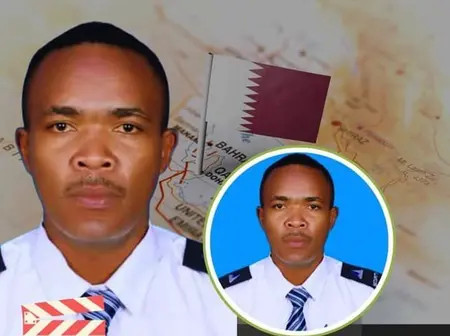The Kenyan migrant community in Qatar is in mourning following the shocking discovery of the lifeless body of 31-year-old John Njuguna. He was a father of two and was found dumped in a toilet in the Gulf nation. According to reports by Tuko News, Njuguna’s death is not just a personal tragedy. It is a grim reflection of a deeper crisis of betrayal and violence among migrant workers.
Like many young Kenyans, John Njuguna left his home country full of hope and ambition. With dreams of securing a better future for his wife and children back in Kenya, he joined the thousands of African migrant workers who travel to the Middle East each year. They all seek employment opportunities.
But instead of safety and prosperity, Njuguna met a violent and undignified end—allegedly at the hands of fellow Kenyans. His body was discovered under horrifying circumstances, abandoned in a toilet. This was a final resting place that underscores the brutality of his death. This tragic event marked the headlines of the Kenyan man’s body found.
The Kenyan community in Qatar has been left reeling by the tragedy. Colleagues and friends describe Njuguna as a humble, hardworking man. He kept to himself and avoided trouble. Many are struggling to comprehend how someone so driven by family and faith could fall victim to such a heinous act.
Even more disturbing are claims that the perpetrators of the crime may be fellow Kenyans. Like Njuguna, these people had left their homeland seeking greener pastures. The alleged betrayal has sent shockwaves through the diaspora. It raises painful questions about trust, solidarity, and survival among migrant communities abroad.
While details of the investigation remain scarce, the nature of Njuguna’s death has sparked a broader conversation. This includes the challenges faced by Kenyan workers overseas. These challenges include harsh working conditions and legal vulnerabilities. They also include internal conflicts within the migrant community itself.
“This is not just a crime; it’s a betrayal,” said one Kenyan expatriate who knew Njuguna. “We come here to support each other, not to destroy one another. If we can’t trust our own, then who can we trust?”
Human rights organizations and community leaders are calling on both the Qatari and Kenyan governments. They demand to ensure a full and transparent investigation into Njuguna’s death. There are growing demands for the suspects to be brought to justice and for better protection mechanisms for migrant workers. This is especially important for those working under vulnerable conditions.
Back in Kenya, Njuguna’s family is grappling with the unimaginable loss. They are also facing the logistical and financial burden of repatriating his body. Many families of deceased migrant workers struggle to afford this.
John Njuguna’s death is a chilling reminder that not all dangers faced by migrant workers come from foreign employers or harsh labor laws. Sometimes, the threats come from within their own ranks. This results in a tragic scenario of a Kenyan man’s body being found in such circumstances.
As his loved ones mourn and his community seeks answers, Njuguna’s story highlights the urgent need for solidarity, accountability, and protection within migrant communities. It is also a sobering call for deeper reflection on the shared responsibilities of those who leave home. They do this not only to seek better lives but also to uphold the values that bind them together—even in foreign lands.

Leave a Reply